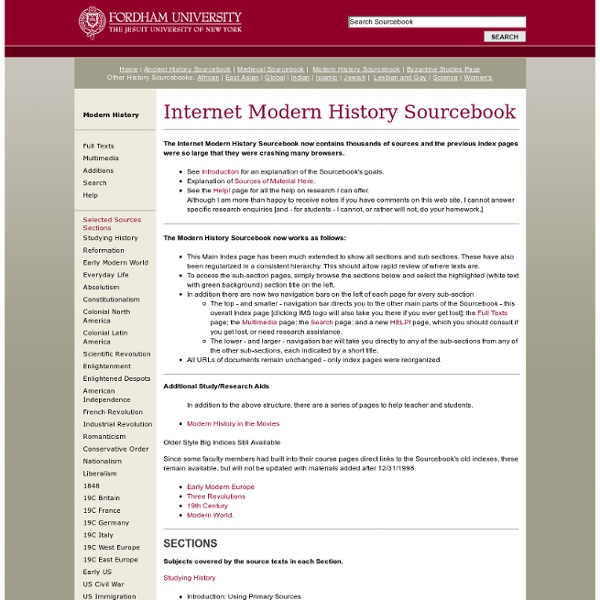Internet History Sourcebooks

Les sources primaires et les sources secondaires - Boîte à outils - Centre d'apprentissage
Contenu archivé Cette page Web archivée demeure en ligne à des fins de consultation, de recherche ou de tenue de documents. Elle ne sera pas modifiée ni mise à jour. Boîte à outils Les sources primaires et les sources secondaires De Michael Eamon, historien et archiviste, Bibliothèque et Archives Canada * On appelle aussi les sources primaires des sources de première main et les sources secondaires, des sources de seconde main. Les sources primairesLes sources secondairesUne source primaire peut-elle être aussi une source secondaire? Les bibliothèques et les archives conservent des objets, comme des documents et des livres, qui nous aident à découvrir les événements qui se sont déroulés dans le passé. Les sources primaires et les sources secondaires, quand nous les utilisons ensemble, nous aident à comprendre les personnes, les idées et les événements du passé. Les sources primaires Les éléments suivants peuvent constituer des sources primaires : Les sources secondaires C.W. Qu'en pensez-vous?
www.cinehig.clionautes.org/telechargement/cinema-hist-prop-mougenet.pdf
Les six concepts de la pensée historique - Univers social | Modulo
Enseignez comment créer l’histoire… de la 4e à la 12e année ! Pour créer leurs récits, les historiens appuient leur analyse des textes historiques sur six concepts distincts, mais étroitement reliés : établir la pertinence historiqueutiliser des sources primairesdéfinir la continuité et le changementanalyser les causes et les conséquencesadopter un point de vue historiquecomprendre la dimension éthique des interprétations historiques. Ce livre est conçu pour guider les élèves vers l’acquisition dynamique et ... Ce livre est conçu pour guider les élèves vers l’acquisition dynamique et effective des compétences de l’historien et tout le plaisir qui existe à construire l’histoire. Points forts :
Histoire - Nicolas Offenstadt est l'invité de Raphaël Enthoven | Philosophie
Comment se fait-il que l’Histoire ne soit pas une science exacte ? Est-ce parce que l’homme est un drôle d’animal dont les comportements déjouent les prédictions ? Ou est-ce parce qu’il incombe à l’historien de penser l’Histoire tout en lui appartenant ? « Comment, français, juif, situé à un moment du devenir, puis-je connaître l’ensemble dont je suis un atome, entre des centaines de millions ? » se demande Raymond Aron. C’est, en effet, tout le problème : comment poser un regard objectif sur l’Histoire dont nous faisons partie et qui imprègne nos jugements sur elle ? Invité : Nicolas Offenstadt Nicolas Offenstadt est agrégé et docteur en histoire. Parmi ses ouvrages : Bonus
Related:
Related:



